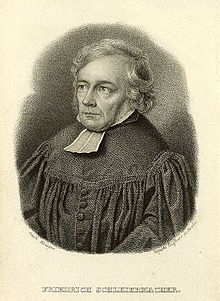
Back فريدريك شلايرماخر Arabic فريدريك شليرماخر ARZ Friedrich Schleiermacher AST فریدریش شلایرماخر AZB Фридрих Шлайермахер Bulgarian Friedrich Schleiermacher Catalan Friedrich Daniel Ernst Schleiermacher Czech Friedrich Schleiermacher Danish Friedrich Schleiermacher German Φρήντριχ Σλάιερμάχερ Greek
Friedrich Schleiermacher | |
|---|---|
 | |
| Gebore | 21 November 1768 |
| Sterf | 12 Februarie 1834 (op 65) |
| Alma mater | Universiteit van Halle (1787–90)[1] |
Friedrich Daniel Ernst Schleiermacher (Duits: ˈfʁiːdʁɪç ˈʃlaɪɐˌmaχɐ; 21 November 1768 – 12 February 1834) was 'n Duitse teoloog, filosoof, en Bybelse geleerde wat bekend is vir sy pogings om die kritiek van die Era van Verligting te versoen met tradisionele Protestantisme. Hy het ook 'n beduidende invloed gespeel in die evolusie van historiese kritiek, en sy werk vorm deel van die fondament van die moderne studieveld van hermeneutiek.
Hy word dikwels, omrede sy diepgaande invloed op die daaropvolgende Christelike Denkwyses, die "Vader van Moderne Liberale Teologie" genoem, en word beskou as 'n vroeë leier in Liberale Christenskap. Karl Barth staan gewoonlik (alhoewel nie sonder uitdaging nie) aan die hoof van die Neo-ortodokse beweging van die twintigste eeu, welke beweging in groot mate 'n poging is om Schleiermacher se invloed uit te daag.
- ↑ Biografie, Friedrich Schleiermacher
- ↑ Kristin Gjesdal, Gadamer and the Legacy of German Idealism, Cambridge University Press, 2012, bl. 156.
- ↑ Paola Mayer, Jena Romanticism and Its Appropriation of Jakob Böhme, McGill-Queen's University Press, 1999, bl. 101.
- ↑ Helmut Thielicke, Modern Faith and Thought, William B. Eerdmans Publishing, 1990, bl. 174.
- ↑ Kurt Mueller-Vollmer (red.), The Hermeneutics Reader, Continuum, 1988, bl. 72.
- ↑ Edward Joseph Echeverria, Criticism and Commitment: Major Themes in Contemporary "Post-Critical" Philosophy, Rodopi, 1981, bl. 221.
- ↑ Anthony C. Thiselton, New Horizons in Hermeneutics: The Theory and Practice of Transforming Biblical Reading, Harper Collins, 1997, bl. 214.
- ↑ name="Hermen"
- ↑ name=Hermen
- ↑ Michael N. Forster, After Herder: Philosophy of Language in the German Tradition, Oxford University Press, 2010, bl. 9.
- ↑ Frederick C. Beiser, Late German Idealism: Trendelenburg and Lotze, Oxford University Press, 2013, bl. 20.
- ↑ Hinson-Hasty, Elizabeth (2013). "'In Each the Work of All, and in All the Work of Each': Sin and Salvation in Schleiermacher and Rauschenbusch". In Wilcox, Jeffrey A.; Tice, Terrence N.; Kelsey, Catherine L. (reds.). Schleiermacher's Influences on American Thought and Religious Life (1835–1920). Vol. 1. Eugene, Oregon: Pickwick Publications. pp. 371–372. ISBN 978-1-60608-005-4.
- ↑ Schwarz, Hans (2005). Theology in a Global Context: The Last Two Hundred Years. Grand Rapids, Michigan: Wm. B. Eerdmans Publishing Company. pp. 144–145. ISBN 978-0-8028-2986-3.
- ↑ Friedrich Schleiermacher, Hermeneutics: The Handwritten Manuscripts, red. deur Heinz Kimmerle, vertaal deur James Duke en Jack Forstman (Missoula: Scholars Press, 1977), bl. 196: "just as the whole is understood from the parts, so the parts can be understood from the whole. This principle is of such consequence for hermeneutics and so incontestable that one cannot even begin to interpret without using it."